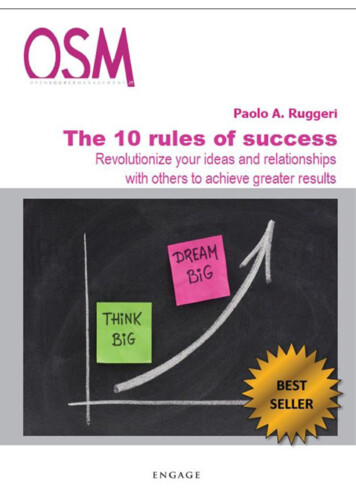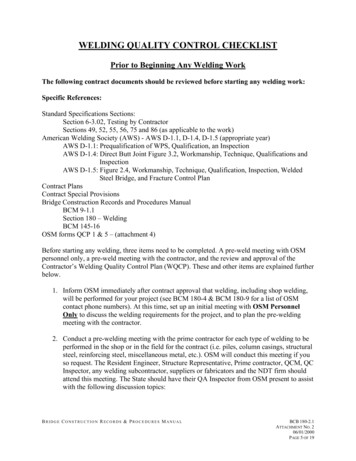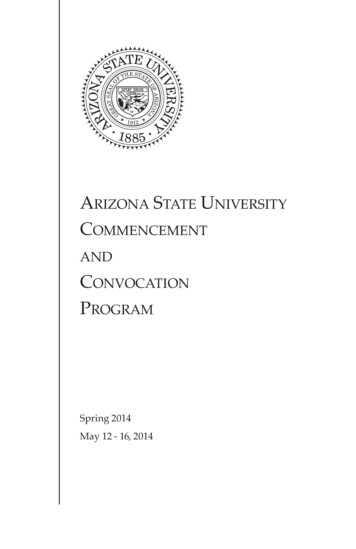
Transcription
Paolo A. RuggeriThe Ten Rulesof SuccessLEARN TO LIVE BETTER, REACH HAPPINESS, & REALIZE YOUR DREAMS.1
Copyright 2017 ENGAGE BOOKS1000 5th Street Ste.207Miami Beach, FL 33139Tel. 1 305 370 LL RIGHTS RESERVEDISBN: .net2
INDEXIntroduction SuccessPART ONE: THE BASICSTHE FIRST RULE:Stop following false leads!THE SECOND RULE:To be successful you have to improve the quality of your exchangeTHE THIRD RULE:Understand, meet, and exceed the expectations of others!THE FOURTH RULE:Become a great human beingPART TWO: THE TURNING POINTTHE FIFTH RULE:If you want things to change, first you have to change yourselfTHE SIXTH RULE:Become a leader!THE SEVENTH RULE:The companions you choose are a determining factor in your destiny avoid toxic peoplePART THREE: THE MATERIALIZATION OF SUCCESSTHE EIGHTH RULE:The power of your imaginationTHE NINTH RULE:The time perspectiveTHE TENTH RULE:The success of an individual is measured by the success of those around themEPILOGUE: We become what we doFOR FURTHER STUDY3
INTRODUCTIONSUCCESSAs I conducted my research on success, I realized that in society there are two differentdefinitions.There is a first group of people who think that success means "be happy with what youhave, no matter what fate has in store for us; do the best you can with the hand you’redealt". For these people, success appears to be a feeling of contentment with what theyhave managed to achieve in life. They tell the great difficulties they’ve overcome and end bytelling you that, all things considered, what they have is all they could have possiblyachieved, and are therefore satisfied with what they have built. In some cases they willmake comparisons between themselves and those who are worse, saying "I shouldn’texpect more. I’m happy with what I have. True, I don’t have much, but there are those whohave even less." Although they are maybe contented these are not the people I want to talkabout.We’re not talking about them because their lives, although balanced, are based on theconcept of "barely enough." When you ask them how they’re doing, they generally respondwith "pretty good." They are people who earn "enough" (but not as much as they truly needin order to realize their dreams), have companies that are doing "OK", that is, "if there areno major upheavals, if all the customers pay at the end of the month, if none of thesalespeople quit" then the company is fine. If something goes wrong, then they haveproblems.I do not know why, but that "barely enough" mentality always seems precarious to me. Akind of "all is well as long as there are no problems." A delicate balance, beyond whichthings could easily go wrong.In this book we will talk instead about the second definition of success: "The knowledgethat you are materializing your dreams". Because success really is just that. It is not basedon the concept of barely enough, but on the concept of ABUNDANCE. Abundance meanshaving much more than what you could ever need. Abundance in a relationship does notmean having three wives, or a wife and two lovers (though this book will do wonders foryou, it won’t be taking things quite that far). But it does mean having such a goodrelationship with your partner that a disagreement, a fight, or your absence for fifteen daysfor work, will not in any way reduce the esteem, affection and harmony that exists betweenthe two of you.By professional abundance, it means earning a lot more than your financial needstechnically require. It means having so many customers interested in your product orservice that you have trouble getting to them all, it means that even an overdue bill or nonpayment by an important customer will not have any affect on the survival of yourcompany.In short, abundance does not mean a delicate balance on which your survival depends; itmeans that things are really going well not just "sort of ok".4
However much the above may seem obvious, today a majority of businesses live with theconcept of "sort of ok". 63% of the population thinks that they could materialize theirdreams only if they win the lottery. Many business owners tell me that "things will bebetter when the economy recovers", the majority of managers have considerable problemswith staff, in short, things are "sort of ok" nearly everywhere. I do not want to generalizethe situation, but frankly, all this "sort of ok", all this "things aren’t that bad, there arethose who are worse off", to me, it means only one thing: the culture of success is beinglost.People who were once idealistic, who chased their dreams, have become "realistic" people,with their feet firmly on the ground, spouting phrases such as "it’s not that simple", and"easier said than done".Looking more closely at all these people who have embraced the "sort of ok" culture, wecan also deduce something else: they too, at one time, chased their dreams. They too sawsuccess as abundance. Then, probably, something happened that caused them to changetheir definition of success, which made them move from the group of definition #2 (therealization of their dreams) to definition #1 (be satisfied with what you have).Well, this book is against the "sort of ok" culture. This book maintains that, if you trulywant to, you can accomplish your dreams. That there is no need to act like Aesop’s fox withthe grapes1, and insist that success or abundance aren’t things that really interest you. Allof us, when we're at our best, seek abundance. What parent, faced with their child’s illness, would not insist, no matter the cost, onconsulting the best specialists in the world? What salesperson would not want, at least for a moment, to have the highest sales inthe company? What business owner would not love, even if only for a day, for their company to bethe undisputed leader of the market? What minimum-wage employee has never fantasized about owning the home oftheir dreams?Nice little fairy tales, you might say. No. It is the "sort of ok" culture that is taking root insociety so firmly, that it is taking away the one thing that has always been crucial: ourdreams.In this book I will not give you a recipe to make "sort of ok" more palatable, instead I willtalk about abundance. How to build the life you've always dreamed of.The book is organized into three parts. In the first, we’ll talk about how to stop beinginvisible, the condition that results from your personal shortcomings and prevents youfrom being visible to the people who can provide opportunities you need to change yourlife. In the second part I will talk about how to toughen yourself up, in order to overcomeany difficulties you may encounter in the path to success, and in the third and final part Iwill cover the subject of real success.The story of a fox that wants to eat grapes from a high vine, but can't reach them. Rather than admitting the problem,and working around it, he instead claims he didn't really want them anyway and walks off.15
The text is full of information and ideas that you can apply immediately to change yourselfand your life. I suggest you read it for the first time from start to finish, taking notes orhighlighting things you need to change or start doing. Then re-read the rules in which youfeel you need to improve several times, as much as it takes for you to start putting theminto practice. I assure you that, following the ten rules, your life will take a definite turn forthe better.Believe me, achieving abundance is not just a matter of wealth or real estate. It is, first ofall, a matter of satisfaction and happiness: a person dies when their last dream dies. If youhave fallen into the "sort of ok" culture, then you are dying piece by piece. You may haveevery justification in the world, and you might even try to convince me, but the problemremains that, deep down, not even you believe your own excuses. Like all human beings,you seek and deserve abundance.This book will teach you to reach it, and to become a champion in whatever business youhave chosen.With my best wishes,Paolo A. Ruggeri6
PART ONETHE BASICSStop being invisible7
RULE 1Stop Following False Leads!A person who feels themselves falling into the "sort of ok" culture, in an attempt to putthings right, will sometimes start looking for red herrings. They do this by looking for thatone opportunity, the amazing discovery that will allow them to become suddenly extremelyrich or successful, and change their life 180 degrees. This is why you see employeeschecking recruitment ads every week, hoping to find the right opportunity, that onecompany that will give them the chance they need. You see salespeople constantlysearching for the winning product, that one really cool and innovative product, that oncelaunched will be in great demand and bring them huge commissions. You see businessowners looking to earn money on the stock market rather than with their company.You also see a great flourish of magazines raving about all the latest and greatestentrepreneurial opportunities: ostrich herding, take up flipping houses, open a bar in CostaRica, launch a successful app, and so on.I do not mean to criticize all of these initiatives, and I absolutely do not want to criticizethose who think you should try to find the right opportunity that will allow you to besuccessful. At least these people haven’t yet fallen into the gray world of realists. They’restilling trying to resist the "sort of ok". They still have some kind of dream.But you know what? These people will never reach success. They’ll never reach it becausethey'll never find that perfect opportunity, as long as they continue to look for it in thewrong place.Like me twelve years ago, seeking opportunities in newspapers, in magazines, in the jobmarket, at employment agencies. They're looking in the wrong place. Whateveropportunities there may be, in the end they prove themselves to be red herrings. It will justbe yet another disappointment that pushes them further into the world of "kind of ok".The real opportunity, actually needs to be something you find inside yourself. When youdon’t succeed, the quality of the opportunity isn’t the problem, YOU are the problem.It may be that someone can manage to build a thriving business breeding ostriches orflipping houses, but the emphasis is on the wrong thing. The emphasis is put on theactivities that they have chosen, when, in fact, it matters very little. What really matters isthe fact that they had developed what I call "the successful personality." It is this, ratherthan the activity itself, which allows people to reach their goals. Until you develop asuccessful personality, all the opportunities that you try to chase will just end up beingred herrings.This is why I say that by looking externally, outside yourself, you are looking in the wrongplace. If you want to succeed, if you want to achieve a state of abundance, you first need towork on developing a successful personality.It will be this personality, more than anything else, that allows you to stop being invisible,this state of inconsequence that prevents people from involving you in the reallyinteresting projects that could bring you abundance. It is this personality that will sharpen8
your vision and more clearly show you which opportunities are the right ones to takeadvantage of.Like all of us, you possess skills that you only partially use. Once you have developed theseskills and your successful personality, you'll find that you no longer have to search foropportunities, they will simply appear before you whenever you need them.Think for a moment: every day on this planet, transactions for billions of dollars areconducted. Every day millions of business people seek partners or collaborators to offeropportunities in exchange for help. Every day customers seek suppliers to entrust withcontracts worth billions. Have you ever wondered why none of these activities involve you?The answer, my friend, is that you're invisible. There is something in your way of beingand doing that causes these people to not even think of involving you.If you start to look for opportunities like crazy, without making fundamental changes toyour personality, you will continue to experience failure after failure. Until one day youfind yourself looking at someone warily when they try to talk to you about success. I hate totell you this, but at this point you’ll be just another face in the crowd of lottery ticketconsumers.Some may object that it is necessary to search for new opportunities, because obviouslywhatever they’re doing now isn’t working. To these people I can say, unequivocally, thatWHAT they do isn’t the problem, THEY are the problem!I still remember my very first day at work. The personnel manager asked me what areas ofthe company I liked most. I replied that I liked everything except HR and sales. Well. I’vespent my entire life working just in those areas!Among the successful people we see every day, many have arrived at their line of work notbecause they sought it out, but by sheer chance. A dear friend and client of mine directsone of the leading companies in home security systems. One day I asked him why he haddecided to go into that area. He told me that several years earlier, the company of one ofhis clients had gone bankrupt and they couldn’t pay him, instead they paid him off with afew thousand dollars worth of security equipment. In order not to lose money, my frienddecided to sell it and so began a career that led him to great success. Henry Ford himselfwanted to break into the world of watches before he started producing cars!Some might even say that "you are actually meant to do something else, the profession ofyour dreams must be in some other area." Watch out for these thoughts, if you have them,because they are your enemies. Years ago, I liked public relations and dreamed of a careeras a consultant in that field, but at the end I became tremendously successful at somethingelse. I know an entrepreneur of great success in the financial industry, whose originalambition was to manage a farm!I'm not asking to stifle your dreams. As we shall see, these are very important, but at thesame time you must realize that success is not an escape from an unsatisfying life,instead, it is the gradual transformation of an existence that doesn’t currently satisfy youinto something bigger and better. Materializing your dreams, in other words, means firstpassing through the phase where you appreciate and excel in what you do NOW. Only inthis way will you become a successful person. Then, trust me, a person who is successfuland knows the rules, can repeat it in other areas (in the end, even the financial industry9
entrepreneur managed to get his farm, but first he had to flourish with his financialcompany).You must not stop dreaming. You simply have to stop looking outside of yourself forsomething that you already have inside you: the ingredients of a successful personality. Asyou get to know these ingredients, stop chasing false leads and instead commit to excellingin your current profession.You'll see that these ingredients will not only lead you to the right opportunities, not onlyremove your invisibility and bring you abundance, but also give you a much better life.With the second, third and fourth rule I will help you to build a successful personality soyou stop being invisible and get involved in real opportunities.UNTIL YOU BUILD A SUCCESSFUL PERSONALITY, ALL THE LEADS YOU ATTEMPTTO FOLLOW WILL PROVE FALSE.10
RULE 2To be successful you have to improve the quality ofyour exchange"Your success in life depends largely on your ability to become an expert in a particulararea and provide outstanding service in that area".Napoleon HillWe live in a world that is based on exchange. Human and business relationships are basedon the pillars of exchange. This is not to say that charity or a desire to help others withoutulterior motives is not important, quite the contrary. However, as human beings, we are atthe center of countless exchanges with other people. Analyzing the "trades" in which aperson is involved, we can understand a lot about why their life is going well or badly.Unsuccessful are generally trying to "manipulate" exchanges in which they are involved inorder to get more by giving less. Truly successful people instead realize that if they want tohave a greater return from others, they must improve the value or quantity of what theyprovide.At the lowest end of the scale we find the con man. He believes that to get more out of lifehe just needs to "package it well" for other people so that they agree to give something ofgreat value (in most cases money) in exchange for something that is worth little or nothing.However his attempt may go, we all know that his life style is full of ups and downs andpoor economic conditions, not to mention the risk of prison.The con man, however, is not the only person trying to artificially manipulate theirexchanges in order to get more out of the system while giving next to nothing. There arealso several companies that base their success solely on their sales pitch and customeracquisition, rather than on any real service or product of value (as can be seen, forexample, in many "pyramid schemes").Then there are people who try to speculate: speculate on the stock market, oil, gold, orflipping houses. They often talk about their great trades but they rarely talk about theheavy losses they have also suffered.Then there are people who think they can "work around" the harsh laws of exchange byinventing that new app that will change the world "I’ll start breeding ostriches becausetheir meat is expensive and this way I’ll earn a lot of money." Dreaming or inventing isgreat but without putting in the hard work is never going to be good enough.Even more common are those who continue to demand things from others without givinganything in return.I've got nothing against inventors. What I'm criticizing are the people who try tocircumvent the laws of give and take, to strive to get more with less, people who hope toreach abundance by artificially manipulating the exchange. These people, contrary to thecommon belief that they are smart or clever, not only never achieve prosperity, but oftenalso live a miserable and boring life.I'm not the first to advocate the importance of exchanges in human relations. Many beforeme have studied the subject, from Ralph Waldo Emerson to Jim Rohn. Emerson, in his11
famous Essay on Compensation, at the end of the 1800s already claimed: "You will bepaid for exactly what you have done, not more, not less. In work and in life you can notcheat. The thief steals from himself, the con man cheats himself." Emerson called thistheory "the absolute balance of give and take, the doctrine that everything has its priceand if that price is not paid, you get something else and not the thing that you thought"and used it to indicate that a person who tries to circumvent the laws of exchange, nomatter how "clever" they may be, won’t get anywhere.Whenever you receive while giving little or nothing in return, you experiencea trauma on a motivational levelOne of the most strongly felt problems of business owners is the generational shift. In mostcases, when the children succeed their parents in the management of the company, itbegins to decline and then closes. This itself is strange, considering that the children ofthese business owners should have had access to better education, have led a morecomfortable life, not so full of hardship or difficulty as their parents, have grown up in abetter environment. The problem is that often they received so much without producinganything, and are so used to an exchange in which things are simply "owed" to them. Thiscauses them to lose sight of something’s true value. What kind of leader could a personever be if they think that everything is simply their due?Take another example of people who receive without giving anything in return: fortunetellers and psychics. They can earn a lot of money while giving nothing in return, except atbest a bit of hope. Have you ever studied the expression on the face of these people? Asalready said by Ralph Waldo Emerson in his famous Essay on compensation, the personwho receives without giving anything in return, gets only sadness, negativity and a life ofmisery.In any case, we don’t want to talk about other people, we’re supposed to be talking aboutyou. Deep down, like everyone, you want to help others, to contribute to theirimprovement and happiness, you want to have an important part in the success of thecompany you're in. True, receiving money for nothing can be a pleasant experience, butafter that how do you feel? Deep down you’re left with a bitter taste in your mouth. Itwould have been a hundred times better if you had earned it.Successful people don’t try to avoid the basic principles of living, don’t seek to earn or gainmoney by manipulating exchange, but instead provide something of great value. If thatisn’t immediately possible, instead of looking for the "next amazing opportunity" that willprove to be yet another false trail, they work on themselves to improve so that they arethen able to produce value.ExchangeA farmer is out in the field. The morning starts at 5:00am, and the plowing, hoeing,seeding, watering, and killing parasites goes on and on until, one day a few months later, abasket full of tomatoes is ready to go to the market.The tomatoes are exchanged for cash or other assets that allow for survival. All of us wouldconsider it bizarre if a farmer tried to go to market without tomatoes, and still demanded12
money just because they had dug, planted, watered, and so on. "Well, good for you," wemight tell him, "but we’re only giving you money if you have tomatoes."As absurd as the example may seem, it makes a point that is still very present for mostpeople in society. People who attempt to go to market with nothing but their actions,rather than the results of their actions. They claim they should receive money in exchangefor action, time, commitment, effort, WITHOUT PRODUCING ANY RESULT.There are employees who think their salary is owed to them simply because of the hoursthey spend at work, for the effort they put into the things they do, for the school degreethey have achieved with great diligence, for the position they hold within the companyhierarchy but where are the tomatoes?The employee who earns a lot is not necessarily the one that works hardest or takes themost on. Instead they are people who, more than others, produce results through theirefforts.An employee in the accounting department is not paid for the hours they spend in theoffice, but for the money they collect from customers; a teacher is not paid for the hoursspent teaching or explaining, but for actually instilling new skills in their students; awarehouse manager is not paid for the hours spent stocking and moving boxes, but for therapidity with which they provide goods to those who need them, for the cleanliness andorder of the warehouse, for their accuracy in avoiding of shortages. The examples areendless.There are salespeople who think they are doing well because they sell a lot to their clients.This is partially true, but a truly successful salesperson is one that helps THE CLIENT TOBE BETTER OFF. The successful salesperson isn’t the one that fills the customer'swarehouse with a bunch of stuff, rather it is the one that ensures the client in turn resellswhat they bought in large volume and earns a lot of money. Consequently teaching theclient how to properly use the products they purchased, teaching them how to run thebusiness, how to advertise, how to sell a lot.Sometimes I see consultants or technicians involved in client companies, but theirinterventions do not give any result. Sometimes they try to get away with being paidwithout providing anything in return, just for the fact that they spent so much time at thecompany. But again, where are the tomatoes?Many people today claim to exchange their time or effort in exchange for money orsomething else. They will not go anywhere. You must exchange RESULTS.ACTIONS WITHOUT RESULTS ARE WORTH ABSOLUTELY NOTHING.So, if you want, you can even try that new business breeding ostriches. Perhaps it’s a goodidea and maybe ostrich meat isn’t so bad, but know that your business will succeed notbecause you hang a sign that says you now sell ostrich meat, or because you put a beautifulInstagram video. Instead, it is specifically because you were able to make the ostrich meata GOOD DEAL for your customer.What is the result you produce and exchange when you do business with people? What isthe great deal people are getting when they choose to work with you?13
Answering this question is not just a matter of finance, your earnings, but primarily aquestion of personal well-being. If you insist on providing something that has little value ortry to make exchanges based on actions or effort and not results, bit by bit you yourself willbe the one that burns out. You'll get used to receiving by giving little or nothing in return,and you'll cripple your basic personality, which is at its heart a positive personality,oriented towards help and contribution. And what do you mutate into? An unfortunate andineffective person.Stop trying to manipulate exchange artificially. Stop giving in to the allure of receivingthings in exchange for results of little value. Accept your basic personality, the personalityof success, get in touch with your deeper qualities and refuse money offered to you whenyou have not given something of value in exchange.Not only you will be successful, but you'll be immensely better off.You can do itTwenty-five years ago I did not earn much. In fact let's face it, I was dirt poor. There was atime in my life that constituted a turning point. My parents lent me money and althoughthey told me that one day I would have to repay them, I had never been pressed to do so.Well, one day I showed up at their door and said, "Now let's do the math. Tell me exactlyhow much I owe you, how much you have lent me all these years". My mother, like anygenerous parent, told me that the money wasn’t a problem, they were just fine without it. Iinsisted on making a list and then we established a monthly amount for the return. Fromthen on I refused to receive more money from them, even though at times I had my owndifficulties. I still remember that when I left I was happy, because I felt I had done the rightthing, even though I was full of doubts. Would I make it? Could I stand on my own twolegs? From there I began to earn more and more, and now it’s been years since I worriedabout money, such is the abundance that I managed to create in my life.Today, I feel the same way about exchange. If I don’t provide the results, then I don’t wantthe money.This view is, in itself, a disruptive force. It forces you to get back to your basic skills, itforces you to innovate, to study, to get busy, and is perhaps one of the most powerfulweapons to achieve success.MoneyMoney is a symbol that represents what, in the past, we physically provided to the market(by "market", I mean the exchange we make with customers, employers, colleagues, etc.).The 100 in the farmer’s pocket is just a symbol of the tomatoes they produced and sold.The money you have at the moment only represents the results or products that youprovided to the market in the past. Money is not a cause, but an effect. A result of whatyou have been able to provide.If you want more money, you shouldn’t look for systems to artificially manipulate theprinciples of exchange, but try to provide something that has more value to the market. Butthe greatest value, however strange it may seem, is not something you will find bysearching out the "perfect" opportunity, or discovering a new and innovative product that14
everyone will buy. High value is produced by maintaining your basic personality andworking to make a deal for your customer or any business relationship you may develop. Itis produced by studying, taking care of the person, assisting them, helping them, andworking hard, but this will be the topic of the next rule.SuccessSuccess is the act of moving to a higher level of exchange.That's all. It is not chasing the chimera, the latest trends in terms of opportunity, it is notabout making a good impression at the job interview for that fantastic company that haspromised 150,000 per year, it is not about guessing which shares will rise in the stockmarket. Success is moving to a higher level of exchange, a level at which what you provideto other people has a much, much greater value than what you receive for it.This will not only take you straight in the world of abundance, but, more importantly, willallow you to rehabilitate and revive the great person, the star player, the slumbering giant,that you have inside: YOURSELF.It's time to get to work.Where are the tomatoes?15
RULE 3Understand, meet, and exceed the expectations ofothers!"Reap what you sow. What we put into the universe is what comes back to us."The Buddhist Law of Cause and Effect.Once you have decided to dedicate yourself to your profession, stop chasing after falseleads, and have decided to improve the quality of your exchange, you will already have thefirst ingredients you need to develop a successful personality. Not only that, the dedicationobtained will also allow you to materialize the third rule of success: understand, meet, andexceed the expectations of others!Wealth depends on the value of what you provide to the marketThe wealth of Bill Gates does not depend on luck, but due to the fact that he has providedthe market with something extremely valuable: the ability to use a computer to simplifypersonal and professional life. Without Microsoft Word, writing this book wo
Well, this book is against the "sort of ok" culture. This book maintains that, if you truly want to, you can accomplish your dreams. That there is no need to act like Aesop’s fox with the grapes1, and insist that success or abundance aren’t things that really interest you. All of us,










